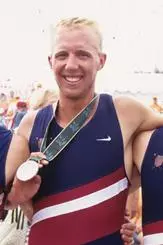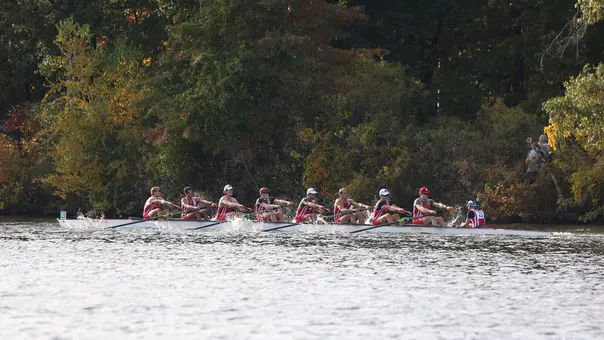
Looking back at past Olympians: Eric Mueller
July 09, 2008 | Men's Rowing
As the Olympic Games in Beijing approach, several UW athletes are continuing the tradition the Badger program has in the Olympics. Watch the Badger Olympians page for updates on our current athletes, as well as a weekly look back at past UW Olympians. Check back frequently as we review our illustrious Olympic history and the Badgers who have made it.
Today's look back features Eric Mueller, a two-time Olympian and currently the men's rowing varsity assistant coach. As a Badger, Mueller received three letters while a member of the varsity eight from 1991-93.
After leaving Wisconsin, the Cedarburg, Wis., native went on to win an Olympic silver medal in the men's quadruple sculls in the 1996 Atlanta Games. He placed fifth at the 2000 Olympics with the men's four.
U.S. national team member in 1995, `96, `00, `01 and `02, he was part of the men's eight champion at the 2002 World Cup in Lucerne, Switzerland and finished third at the 2002 World Championships in Seville, Spain. His men's four took fourth at the 2001 World Championships, while his men's eight was a bronze medalist at the 2000 World Cup, again in Lucerne. He also won a bronze medal with the men's quadruple sculls in Lucerne at the 1996 World Cup.
Currently, Mueller is set to enter his fifth season as the Badgers' freshmen coach. Since his return, the UW freshmen have improved from a bottom six national finish in the year before his joining the program to a return to the national grand finals.
This is Mueller's second time coaching the Badgers. He spent 1998'99 as the assistant varsity coach, before leaving to train for the 2000 Olympic Summer Games in Sydney, Australia. During his previous stint, he was responsible for the Badgers ' small boats and led them to four gold medals and one silver medal at the Intercollegiate Rowing Association national championships. The result helped Wisconsin begin a four-year run as winners of the Ten Eyck Trophy as the national team all-points champion.
Mueller Q & A
How did you get your start in rowing'
It is funny because I started as a freshman here at Wisconsin and I was recruited by my freshman coach, Dan Gehn, at SOAR over at Union South and that is what I am doing every day right now. It is fun to say that when I meet someone who looks physically like they could be a good rowing prospect I tell them I met my coach right over there at the door and then I went on to row at Wisconsin and two Olympics. It is a fun line to bust out once in a while.
Did you have any kind of sports background before that '
I went to high school at Marquette and played basketball my first two years there. I ended up growing a lot my sophomore and junior years there and my coordination didn't really keep up. I didn't end up playing ball again, but ended up doing track my junior year and swimming my senior year. I swam when I was really young and lifeguarded through high school in the summer. I definitely had some fitness background, but I wasn 't a star athlete, that is for sure.
How did your Wisconsin rowing career look '
I started in the fall of 1989 and the varsity eight won the national title in the spring. It was an impressive thing. It really showed that this program was the real deal and inspired me to keep going.
I was in the freshman four that Dan Gehn took to the Head of the Charles, so that was great to be traveling right out of the gate. We don't do that now, but that was pretty cool to do.
When I came back the next fall, I was in the varsity eight the whole time. I would switch back and forth for practice, but in every race I was up there. I don't think I had any races in the JV. Between the Eastern Sprints and the IRAs, I never won a medal, but I did make the finals a number of times.
I stayed another year after I finished rowing in 1993 to finish up school and get a degree in mechanical engineering and continued rowing.
What happened with your rowing career between the end of your Badger career and your trip to the 1996 Olympics'
A bunch of Wisconsin alumni who were some of the more serious rowers were friends of mine ended up going to Washington, D.C., ended up in a quadruple sculls development camp. We rowed the quad all summer and took the boat to the 1994 U.S. World Championship Trials. We were the only challenging boat to the U.S. national team, which was coached by Igor Grinko, so we were the only reason they had to race. I think we were with them for 10 strokes and they were gone.
Eventually, I got an invite from Igor to move down to Augusta, Georgia. I moved down there the first week of January of 1995. That was pretty cool. It was not what you would imagine. If you think, 'alright, I am going to the U.S. national sculling center you think of at least a solid boathouse, but I got there and it was an old warehouse with holes in the ceiling.' I don't know what they used to keep in there, but it was owned by the city's port authority right on the Savannah River. It was almost Rocky-like in that there were just weights all over the place. I wish I would have taken more pictures because it was pretty tough.
I think there were 14 or 15 guys training down there and Igor made the quad the priority boat for sculling. While he was doing that, he was also trying to find guys for the single and double in preparation for the 1996 Olympics.
When I first got down there I had an erg test within three of four days of showing up. I remember pulling a 6:09 or 6:08 which is pretty pathetic for someone my size, but after training with those guys in an environment where you are just trying to survive and beat the people you are training with, I lowered by score significantly.
The first trip, I think he took eight heavyweight guys to Europe for eight weeks to race three or four times. That was an awesome experience.
Eventually, Igor moved me into the quad and things started to go fairly well. We won the 1995 U.S. World Championship Trials, went over to race at Henley and then the Lucerne race. Igor, a former Soviet coach, still had connections so we trained over in Lithuania for a few weeks and had to teach them how to cook spaghetti to add to our meat fat pies that we were eating. We ended up making the final in the 1995 World Championships.
The next year, we got down to eight guys again and then traveled to San Diego, where the main Olympic selection took place. I definitely remember rowing for four or five weeks and not having any idea where I stood, but eventually we kept going out in the same lineup and I was in there. We then trained in Flagstaff, Arizona for altitude training on and off before the Olympics. The trials were in April on the Olympic course, but we won by something like 15 seconds to make the team.
We went on to win the silver behind Germany.
What about the 2000 games' How did you make that team'
After the 1996 games, I thought I was completely done. I got a real job and definitely wasn 't training, but I stayed in shape. I did that for a year and half before coming back to Wisconsin as an assistant coach for the 1998-99 season and started training again, but it wasn't enough. Following that year, I stayed out at a sweep camp in Princeton, N.J., where they were putting together an eight, a four and a pair. The eight had won the previous two years and so getting into the eight would be tough. I didn 't make it in 1999, but it ended up working out pretty well in the four in the fall.
Unfortunately, the four didn't finish high enough in the 1999 Worlds so it wasn 't an Olympic-qualified event for the U.S. That meant after we won trials in 2000, we had to race in Lucerne and finish first or second to get a spot in the Olympics, and we won. The pair was in the same situation and we took two additional guys to give us eight guys. All eight jumped in an eight in the Lucerne race and ended up taking third there against all the eights that were going to the Olympics, so that was fun.













